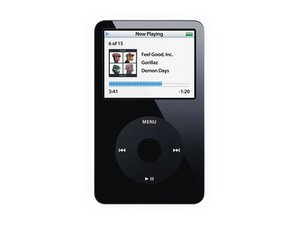Why won't my Mac restore my iPod?
I have a 2020 Mac mini with an M1 processor running Sonoma 14.4. I recently bought an iFlash Solo and a 512gb Sandisk SD card that is formatted with exFAT. I was able to disassemble my iPod and replace both the hard drive and the battery.
When I power up my iPod, it displays the "Connect to a computer" screen. Okay, sure!
When I plug in my iPod, the Finder launches and recognizes that there's an iPod connected to it. It then asks me to restore the iPod, to which I say "yeah, of course, let's do it."
The Mac mini spins for a moment, then prompts me with a security dialog from AMPDevicesAgent for my username and password. I give it my credentials, and then... nothing.
The Mac mini just sits on a screen that says "iPod Recovery Mode" and "Your Mac is restoring the software on this iPod". There are no progress indicators anywhere on this screen (although one briefly does appear and disappear after I click the "restore" button and before the AMPDevicesAgent security dialogue appears).
It feels like it's silently failing with no additional steps I can take to restore this device to its former glory (with substantially more space, of course).
Here are some debugging steps I've taken so far:
- I tried three different 30-pin cables, and I tried using a USB-C dock and directly connecting to the machine. The dock doesn't seem to want to work right, but the connection seems strong when I go directly into the back on my Mac mini. Grateful that this machine still has USB-A ports.
- I directly mounted the SD card to this machine and it recognized it immediately.
- I opened the Console and searched for any entries created by AMPDevicesAgent. Shortly after I grant it permission to do its thing, it creates an error report and saves it to a file like ~/Library/Logs/DiagnosticReports/Retired/AMPDevicesAgent-2024-07-08-225324.ips. There isn't much in this report, but I'm happy to share its contents if someone thinks it'll help
Things I haven't tried:
- A different SD card. I suppose I have a 32gb card laying around I can test, but I'd obviously like to use this bigger one.
- A different machine. I do have a 2019 MacBook Pro laying around that I could try, but I'd need to use the same USB dock to connect to it as it's the only dongle at my disposal at the moment. I also think there might be an old Windows 7 laptop laying in the basement, but I'm not positive I even have the power cable for it, and besides, my music library is here on this Mac.
Any suggestions?
Es esta una buena pregunta?

@ sounds like an issue caused by the "card that is formatted with exFAT". Try the smaller card and format the card to HFS+ After that consider this
- de oldturkey03
@oldturkey03 Thanks for the fast reply! I did try formatting the card as HFS+ to no avail. I also used a smaller 32GB SD card which did not work.
I also tried the instructions you shared and I'm not seeing that 1434 error show up ever.
I did some more digging into the logs folder and found a bunch of logs in a folder called ~/Library/Logs/iPod Updater Logs/. They all end with these two lines:
```
2024-07-09 15:41:48 ERROR +[DiskPartition writeHFSPartitionMap:atOffset:]:75 Bad disk size of 33554432
2024-07-09 15:41:48 ERROR -[DiskPod updateFirmware:andFormat:]:1103 Error 29 writing partition map
```
It didn't matter if I was using my 512gb card or 32gb card, or if the disk was formatted HFS+, exFAT, or FAT32.
- de timcredible
More investigation: I think the size given in the error message ("33554432") is in bytes, which roughly matches the disk size that shows up in Disk Utility under Apple iPod Media (32MB).
Again, it doesn't matter if it's my bigger SD card or smaller one. Both will only ever show this 32 MB uninitialized partition in disk utility.
I did try to reseat the cable into the iFlash Solo, but that didn't seem to work.
- de timcredible